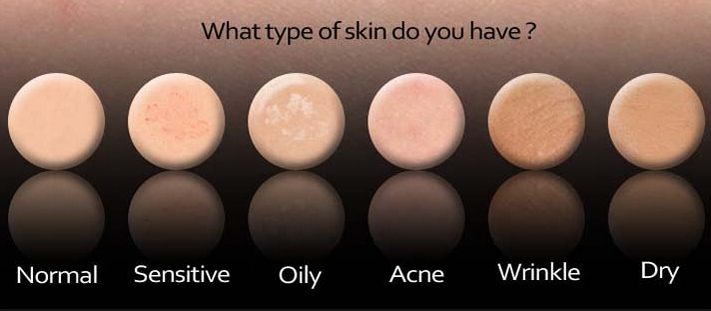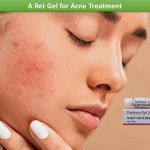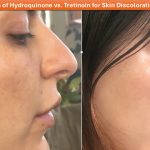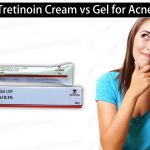Acne has a long history since decades, acne attacks on almost everyone once at a time or more than once in his or her lifetime. To get rid of acne or acne removal is not that tough as some people may pretend. It can handle smartly with time.
A person can experience acne more or less than others because of his or her skin type, is it true? Well, the fact is everyone does not suffer from acne breakouts in the same manner, but is it related to a skin type or does it play a role in a skin condition? It’s still a matter of research at large.
What Does The Expert Say?
According to Dr. Leslie Baumann, CEO of Baumann Cosmetic Dermatology and author of New York Times bestseller, we’ve been told that one of the biggest skin care mistakes we do by using the products that aren’t compatible with our skin type. She further adds, “Properly identifying skin type is the base key to caring your skin.”
In this way, it can be said that if a particular skin care product is beneficial for one skin type; not necessary if it will be that much effective for another one too. Therefore, if you experience frequent breakouts of acne, you should not copy the procedure that is being used by others rather you choose what is best for your skin type and its sensitivity.
Traditional Classification of Skin Types:
How do you identify your skin type? Experts determine your skin type based on its nature and complexion of the skin. Traditionally, skin types are classified into:
- Normal Skin
This type of skin shows no signs of flakiness or oiliness. People with normal skin type feel smooth or say no irritation as such. It requires gentle care for cleansing with milk cleanser that does not have stripping effects.
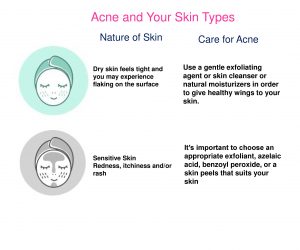
- Oily Skin
Oily skin looks shiny, but it may feel slick at times. People with oily skin, usually experience acne breakouts. It’s a bit challenging to find a perfect skin cleanser for oily skin. You need to take extra effort to remove oil and keep your skin normal.
- Combination Skin
A combination of dry and oily skin is very common to see. People with combination skin have the highest density of oil glands in the T-zone of the face (chin, nose, and forehead). Therefore, dryness resides at the periphery of the face and an oily sheen in the center.
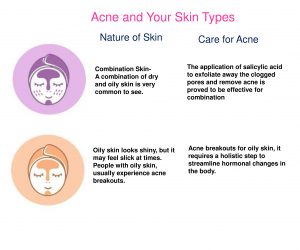
- Dry Skin
Dry skin feels tight and you may experience flaking on the surface. For example, if you feel tightness in the skin after cleansing and some dry patches are visible after a wash, it means you have a dry skin.
- Sensitive Skin
Redness, itchiness and/or rash in the skin are probably seen in the people with very sensitive skin. A contact of chemical soap can further irritate a sensitive skin. Natural or herbal products are the best care for such skin.
How Acne Occurs:
The clogging of skin pores is a major factor in causing acne. It’s found that when the oil glands produce more oil, it accumulates in skin pores and blocks them. This way the skin raises the risks for acne breakouts. Some other factors like hormonal disorder, external pollutant, diet, deficiency of water, use of chemical beauty products and unhealthy lifestyle also play a role in acne breakouts.
Acne and Skin Type:
Whether you have a dry, oily or any other skin type, the risks of acne breakouts are always there.
- Care for Sensitive Skin
Some people have more sensitive skin while some people’s skin is insensitive to chemicals and other allergens. The application of a chemical skin care solution on a sensitive skin may cause some complications including acne.
The pigmented skin is relatively more sensitive than other skin types as it is prone to be affected by acne. Whether you have tan, black, olive, white, or Asian skin, the changes in the pockets of pigment may encourage acne breakouts. A beauty product that forces the skin to change its natural colour can trigger acne, so it’s important to choose an appropriate exfoliant, azelaic acid, benzoyl peroxide, or a skin peels that suits your skin.
- Acne Breakouts to Oily Skin
Oily skin is the most common ground for acne breakouts as compared to other skin types. If the oil glands produce more oil in such skin type, chances are high for skin pore blockage. Moreover, the acne-causing bacteria are easily developed in the oily skin. The overall condition of oiliness/dryness is largely determined by the genes and regulated by the hormones; these two factors are also responsible for causing acne.
Talking about the solution of acne breakouts for oily skin, it requires a holistic step to streamline hormonal changes in the body. In women, dermatologists probably recommend a controlled use of birth control pills to avoid the hormonal imbalance. In addition, you have to adopt an acne solution regimen that involves skin care lotions, herbal products, and natural ingredients to open clogged skin pores and remove harmful bacteria.
- Deal with Dry Skin
Dry skin may also develop acne. In fact, people with dry skin require handling acne breakouts in a more cautious way than those who live with oily or combination skin types. Dry skin allows development of dead skin cells that can block skin pores. Furthermore, clogged pores raise the risk of developing acne as well as other skin conditions. Dry skin is also conducive to acne if you have larger-than-average skin pores. You can say, it is a bit challenging to deal with acne for the people with dry skin, as they have to deal with dryness and dead skin cells.
As far as acne problem on dry skin is concerned, you have to be careful not to aggravate or irritate skin while removing acne; otherwise, there could be more redness and rash. You need to find an acne product that can soothe and calm your skin. Those who have both dry and acne-prone skin has to apply less skin lotion to decrease the number of clogged pores and blackheads or whiteheads. Addressing the cause of pimples and blemishes first is the best way to escape from acne on the dry skin. You can use a gentle exfoliating agent or skin cleanser or natural moisturizers in order to give healthy wings to your skin.
- Acne Solution for Combination Skin
The nature of combination skin is almost similar to normal skin. Both develop more oil in the T-zone that involves your nose area, forehead, chin and upper lip. Because of higher saturation of oil, T-zone is more affected by acne and pimples. People with combination skin are more likely to develop blackheads and whiteheads.
The application of salicylic acid to exfoliate away the clogged pores and remove acne is proved to be effective for both combination and normal skin types. Some other products including antioxidant-rich skin cleanser, herbal elements, and moisturizer can also remove skin blemishes including acne spots.

